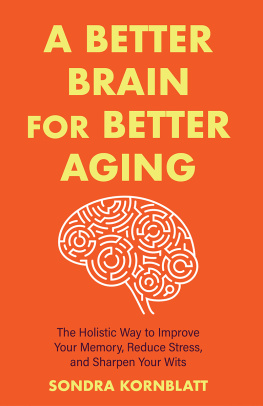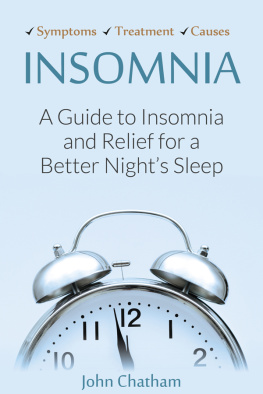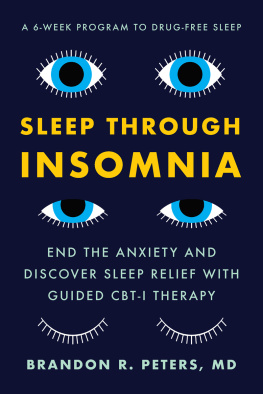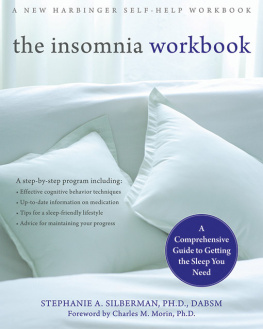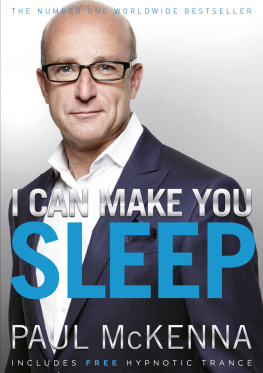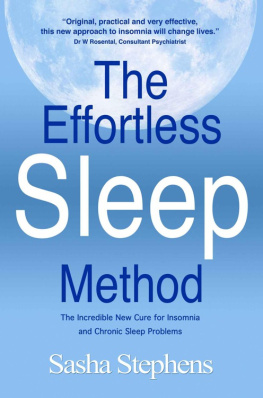
First published in 2010 by
Red Wheel/Weiser, LLC
With offices at:
500 Third Street, Suite 230
San Francisco, CA 94107
www.redwheelweiser.com
Copyright 2010 by Sondra Kornblatt
All rights reserved. No part of this publication may be reproduced or transmitted in any form or by any means, electronic or mechanical, including photocopying, recording, or by any information storage and retrieval system, without permission in writing from Red Wheel/Weiser, LLC. Reviewers may quote brief passages.
Library of Congress Cataloging-in-Publication Data
Kornblatt, Sondra.
Restful insomnia : how to get the benefits of sleep even when you can't /
Sondra Kornblatt.
p. cm.
ISBN 978-1-57324-467-1 (alk. paper)
1. Insomnia. 2. Sleep. 3. Rest. I. Title.
RC548.K67 2010
616.8'4982--dc22
2009031278
Cover design by Stewart Williams
Text design by Donna Linden
Typeset in English Grotesque, Miller Display, and Perpetua
Cover photographs: Waves on beach MBPHOTO/iStockphoto.com;
Starfish Dmitriy Kalinin/iStockphoto.com
Printed in Canada
TCP
10 9 8 7 6 5 4 3 2 1
The paper used in this publication meets the minimum requirements of the American National Standard for Information SciencesPermanence of Paper for Printed Library Materials Z39.48-1992 (R1997).
Dedication

To Ragini Michaels: The only way I could explain Restful Insomnia was because of your teachings about paradox, identity, and being simultaneously spiritual and human. Thank you for helping me be (relatively) calm with your support on living life, not drama, connected to my Essence. May you be a happy and well rewarded Mystic in the Marketplace.
To three whom I wish could see this book:
My husband Howard: for your unwavering support of my writing Restful Insomnia (even though you didn't need it), and trust that it would help many lives. We all miss you.
Diane Rodriguez: for your steady and transforming presence. You were a fellow traveler of inner roads and outer reality. Thank you for accepting my quirks and supporting my strengths with a joyous heart.
Michael Pitrone: I have not begun to grieve you, my nearly lifelong friend. I'm still waiting for you to get back from Italy-in-the-sky, so I can tell you the latest, laugh at despair, sing Jennifer Warnes, and argue about the Right Use of Will. I dreamt last night about editing your head.... What does that mean? You grew up, but never grew old.
I love you all, and am so blessed to have you in my life.
Contents

Acknowledgments

MY ACKNOWLEDGEMENTS ARE A PARTY, and you, dear reader, are the guest of honor. Come on in, let me introduce you to these energizing and loving people who have supported my Restful Insomnia journey for almost ten years.
In the living room are my writing companions: Jodi Forschmeidt (who helped with editing and kept my writing down-to-earth), Michael Pitrone, author Ann Gonzales, Louisa's writing group, Ragini Michaels, Teresa Dahl, Irene Alexander, MJ Ryan, Jacque Boyd, writing teacher Priscilla Long, and my smart coworkers at Group Health. Thanks to my caring agent, who presented my proposal to those big New York publishersand thanks to them for refusing, because those three years made me and the program much stronger. And thank you to Conari Press, from the editors Caroline Pincus and Jan Johnson, plus the bright publicity from Bonni Hamilton and Allyson May. I couldn't have asked for a better publisher.
To honor how much writing I did in their coffee shops, all these folks are drinking Starbucks coffee. I didn't learn how to get on their Internet, which kept my productivity high.
On the stairs you can see my clients and students from the past eight years. They've taught me the commonalities and individual quirks of insomnia, as well as how the techniques have worked during their nights. Their stories (with names changed) illustrate the points in the book.
In the hall are medically wise people chatting about health: avant-garde sleep doctors Teresa Jacobs, Ron Green, and Suzanne Krell who supported my Restful Insomnia program early on; Kathe Wallace, who reframed my view on getting up at night; Carrie Lafferty, who reframed my experience of my body; Fernando Vega and Sheldon Goldberg, doctors and humans extraordinaire.
Let's grab something to eat in the dining room, so I can introduce you to my friends. The PEPS families, who've been meeting for seventeen years since our eldest were born: I could not have gotten through this first (plus) year after Howard's death without younot to mention the sixteen prior years. The Paradox Soiree: your wisdom, laughter, and togetherness make the journey of being alone more peaceful. Scott Caldwell, Evan Kentop, Greg Schroder, Billy and Sarah Pitrone: your presence carries new connections and brings back the essences of Diane, Howard, and Michael. And to those whose names have slipped at the moment (it's past my bedtime and this is past due), I appreciate you.
Finally, my families are crowded in the kitchen: To Nancy, Robert (I'll give this book to you on your 100th birthday in 2010), Lieschan and Piotr, Robert and Tanya, Jo, Colleen, Karen, and nieces and nephews, who make every get-together a celebration. To my parents, David and Barbara, whose pride and support allowed me to explore new grounds; to Rebecca and Henry for your caring by heart and by phone; to Anne for listening to my endless stories of woe, supporting my writing, and engaging in gmail chats on the difference between poo and poop; to nieces and nephews and legal or illegal partners who are most generally amusing. And deep affection for Milo and Ella, who took the bus, ate frozen pizza (cooked) with no veggies for many dinners, tolerated missing me at games and mealtimes, and still cheered each completed chapter. I love you.
Time to pop open some champagne and celebrate these amazing human lives and the birth of this book. Thank you, thank you all! Let's party!
Foreword

IT IS UNAVOIDABLE: every living creature needs sleep. Insomnia refers to the inability to get enough sleep to feel rested the next day. It can be described several ways: acute or chronic, trouble falling asleep or staying asleep, or waking too early. Some people have more than one form of insomnia, and overall it affects one third of adults at some point during a year. Insomnia can be a disorder in its own right, one which doctors and scientists know little about, but often it is a symptom of some other medical or psychological condition. In order for any treatment of insomnia to be effective, these other conditions must be evaluated and either ruled out or treated.
Insomnia can be an exasperating condition for both sufferers and those helping with treatment. Sleeping pills are often effective but are not the right choice for many, and most patients do not want to be on medicines for a long time. Habit changes (e.g., sleep hygiene, stimulus control, sleep restriction) can be very effective, but take patience, repetition, and, for many, are frustratingly difficult. Cognitive behavioral therapy for insomnia (CBTI) addresses some of the unpleasant thoughts about getting a good night's sleep that can aggravate insomnia.
Next page

